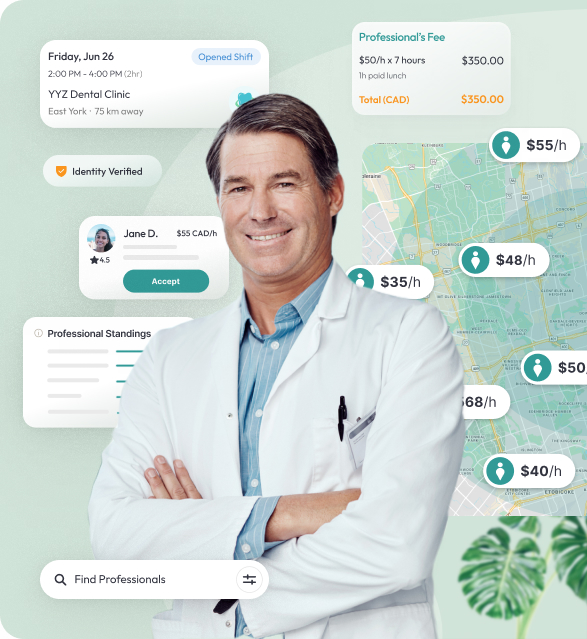Dental Hygienist vs Dentist: Unveiling Career Paths
Dentistry has a well-established history in Canada. From W. G. Beers to W. A. Price – there have been multiple amazing dentists in the nation’s history. Today, the dental industry is observing a mind-blowing growth rate of 30% (as per 2019 statistics). So, which career pathway would be suitable for you? What sort of a dental care professional would you like to become?
Many youngsters prefer to become either dentists or dental hygienists. This blog will compare these two jobs and give you an overview of dental hygienist vs dentist. Based on this info, you can compare these two dental career paths and choose the one you find the best.
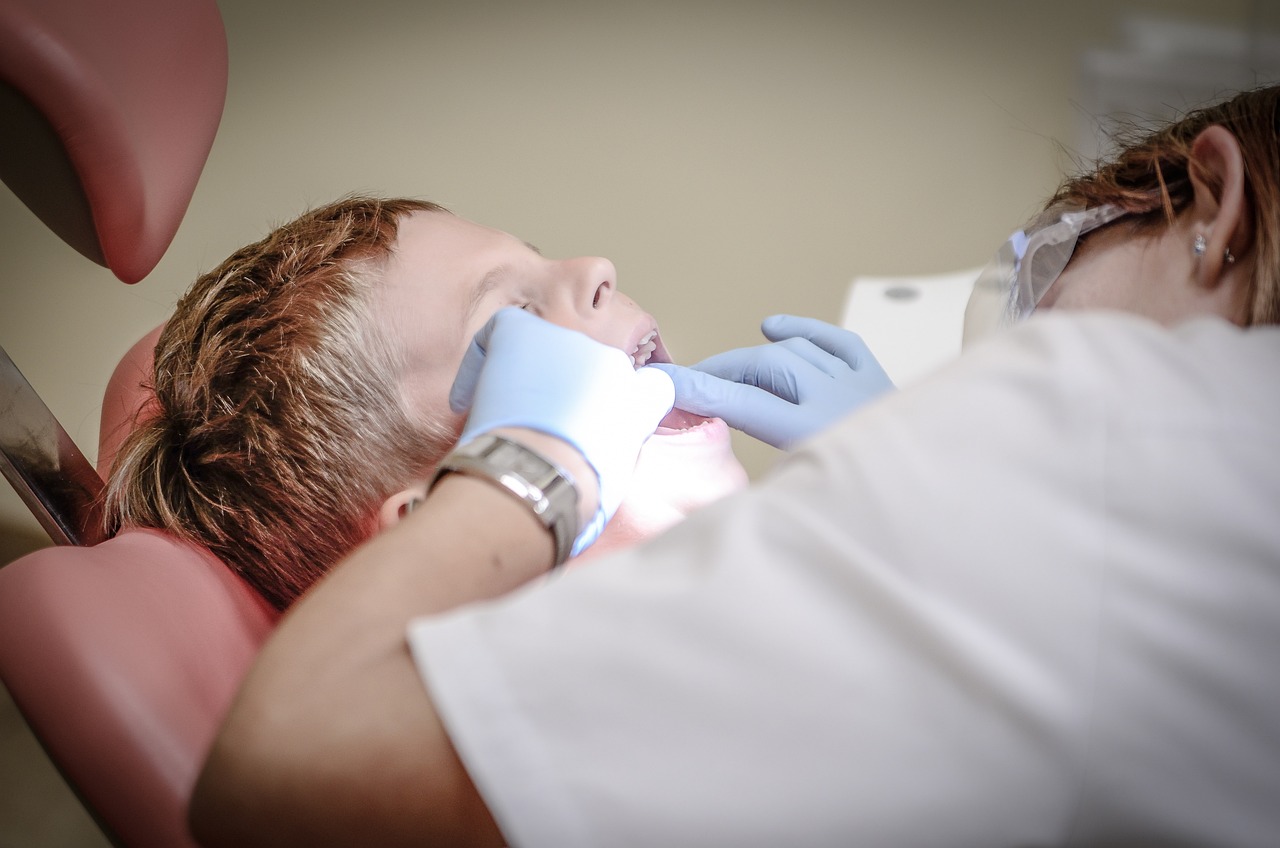
Dental Hygienist: Role and Responsibilities
Let’s look into the profession of “dental hygienist” first and see what they do.
What Does a Dental Hygienist Do?
The job roles of a dental hygienist revolve around providing preventive care before your teeth end up losing their vigor. As an oral health specialist, they prevent your teeth and gums from loosening their grip. Their job is to maintain dental wellness.
Moreover, they will assess your current oral health by taking X-rays and sharing with you tips so you can take good care of your gums & teeth.
Key Responsibilities of a Dental Hygienist
The key responsibilities of your friendly neighborhood dental hygienist involve several dental cleaning procedures, such as the following:
- Dental scaling and polishing
- Tooth decay prevention
- Applying sealants and fluoride treatments
- Educating clients on oral hygiene best practices
In short, they’ll look for the early signs of oral diseases. Also, they help patients make the right dietary choices for optimal dental health. You can learn amazing oral hygiene practices from a dental hygienist.
Educational Requirements for Dental Hygienists
You’ll have to get an associate degree in dental hygiene from an accredited program first. For advanced opportunities, you’ll pursue a bachelor’s degree. Then, you’ll have to look into getting the dental hygiene certification by applying for your National Dental Hygiene Certification Examination (NDHCE).
Skills and Qualities of a Successful Dental Hygienist
Hopefully, you now understand the basic dental hygienist duties properly. If this is a profession you are interested in, develop these skills to become a successful dental hygienist:
- Active listening
- Effective communication
- Empathy for your patients
- Emotional intelligence (EQ)
- Manual dexterity for dental procedures
- Teamwork and collaboration
Dentist: Role and Responsibilities
Before we do a little RDH vs dentist, let’s learn what a dentist does. We guess that you already know the basics of what being a dentist entails. However, a brief description of a dentist’s job role will allow us to compare this profession with the work of dental hygienists.
What Does a Dentist Do?
As one of the most popular dental career paths, dentists will diagnose and treat dental health problems. Say you suffer from tooth decay. In this case, you’ll see a dentist. The dentist protects your dental health by filling cavities, conducting extractions, and performing other procedures.
Key Responsibilities of a Dentist
In short, giving you complete dental treatment is the job of a dentist. The hygienist will make sure that you don’t get cavities; however, once your teeth start showing signs of decay, you will have to see a dentist. Diagnosing and treating dental health issues will fall under a professional, experienced dentist’s purview.
Educational Pathway to Becoming a Dentist
It’s a no-brainer that you must obtain the appropriate dental health education to become one. It requires getting a doctorate in dental surgery (DDS) or dentistry (DMD). After graduating, you will have to sit in a relevant exam and get your license to practice dentistry in Canada.
Skills and Qualities of a Successful Dentist
Besides possessing dentist qualifications, you must also have the right skills to practice it. Here is a breakdown of some of the most vital soft skills for a dentist to have:
- Communication and education
- Attention to detail
- Compassion and patience
- Flexibility and adaptability
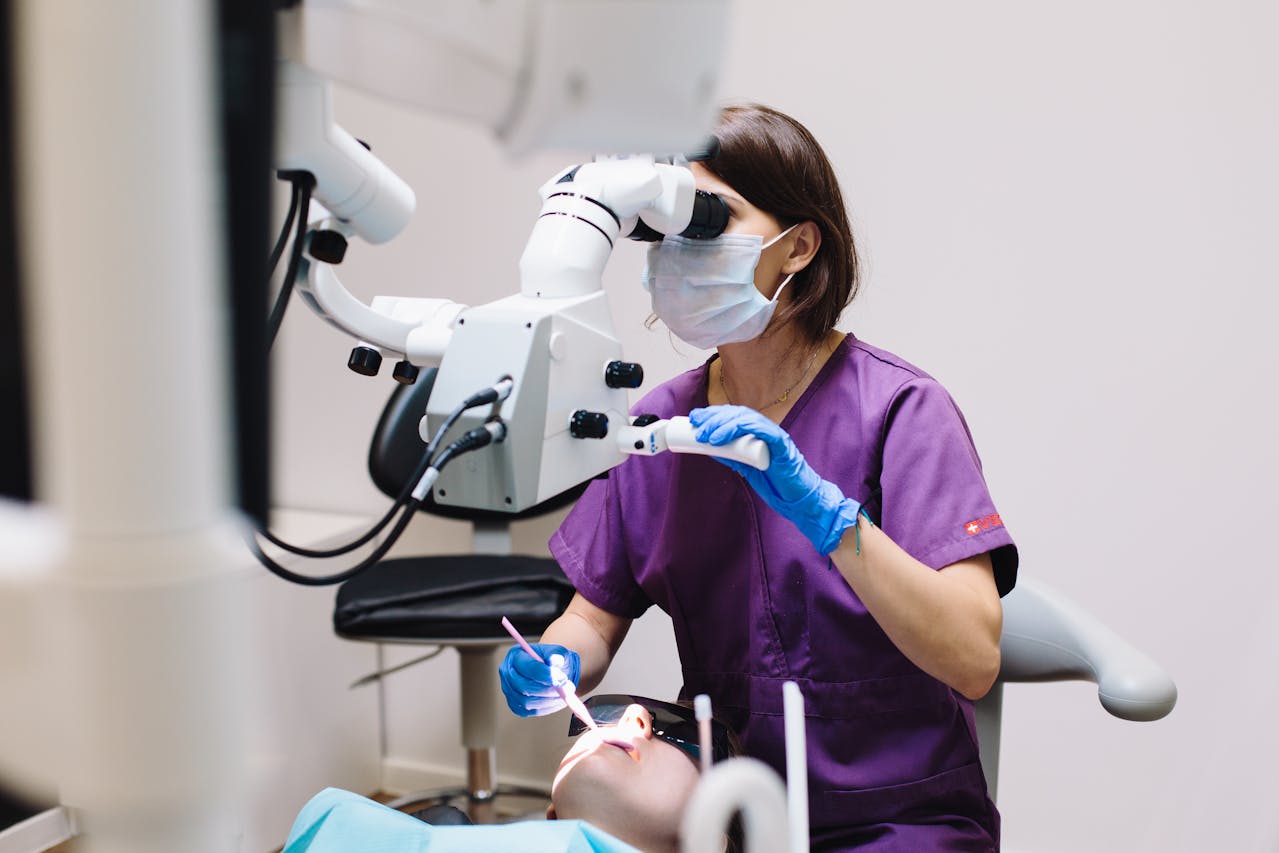
Comparing Careers: Dentist vs Dental Hygienist
Recent studies show that Canada will face a shortage of about 5,000 dentists by 2028. On the other hand, however, the dental hygienist profession grew by a whopping 285% in the last few years. Here, we’ll look into dental hygienist vs dentist to compare these dental career paths. It will help you determine which one’s better.
Dental Hygienist vs. Dentist: Scope of Practice
More than 25,000 dentists operate in Canada, as per the most recent statistics. However, there are 33,000+ dental hygienists employed across various Canadian clinics today. We’ve explained above how the scope of practice between them differs significantly; hygienists maintain your dental wellness while dentists restore it.
Work Environment: Hygienist vs. Dentist
Dental hygienists typically work in various settings, including private dental practices, hospitals, community health clinics, and schools. So, their work environment lets them collaborate closely with dentists while having the option to work part-time or full-time. That’s why dental hygiene is called the “fast track to middle class” by American student counselors.
On the other hand, dentists usually work in private practices or dental clinics where they have more control over their practice operations. The dentist’s environment may involve managing staff and overseeing the business side of the practice.
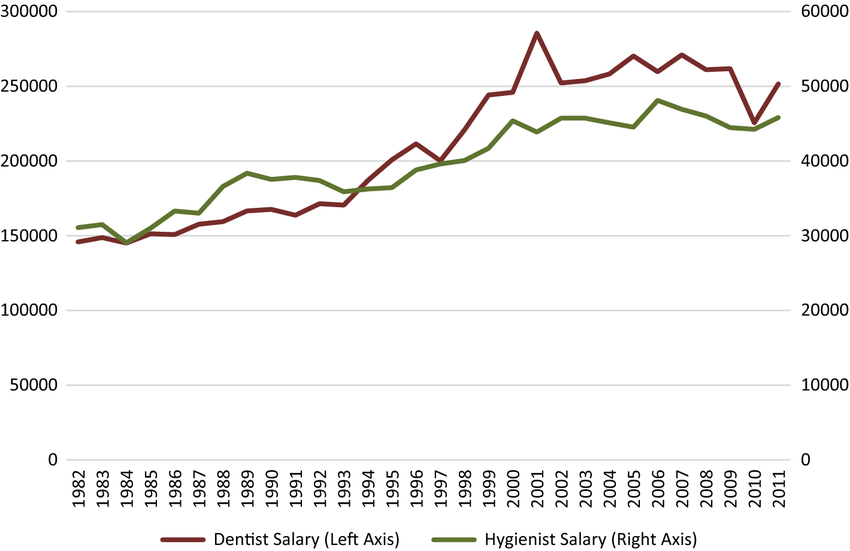
There is a notable disparity in salary between these two professions. When you carefully do a dental hygienist vs dentist salary analysis, this is what you learn:
- Dentists earn $173,000+ on average
- Hygienists make $98,921 on average
However, this disparity ceases to exist in countries like the US, where dentists receive a slightly higher salary than hygienists (since 1994, at least). This survey shows that dental hygienists can be financially well-off than dentists in specific circumstances.
TempFind: Benefits of Dental Temporary Staffing
Many clinics all over Canada are looking for temps with dental health expertise. Want to know how they’re finding top talent? These clinics use TempFind to find a dental hygienist with all the necessary qualifications. If you want to get discovered by them, set your availability. It’ll work this way:
- Complete your profile
- Set your rates and availability
- Apply for a job if you want
- Appear on search results
- Say yes to booking requests
- Start earning a decent salary
So, don’t miss out on a wonderful opportunity to become a dental care professional.
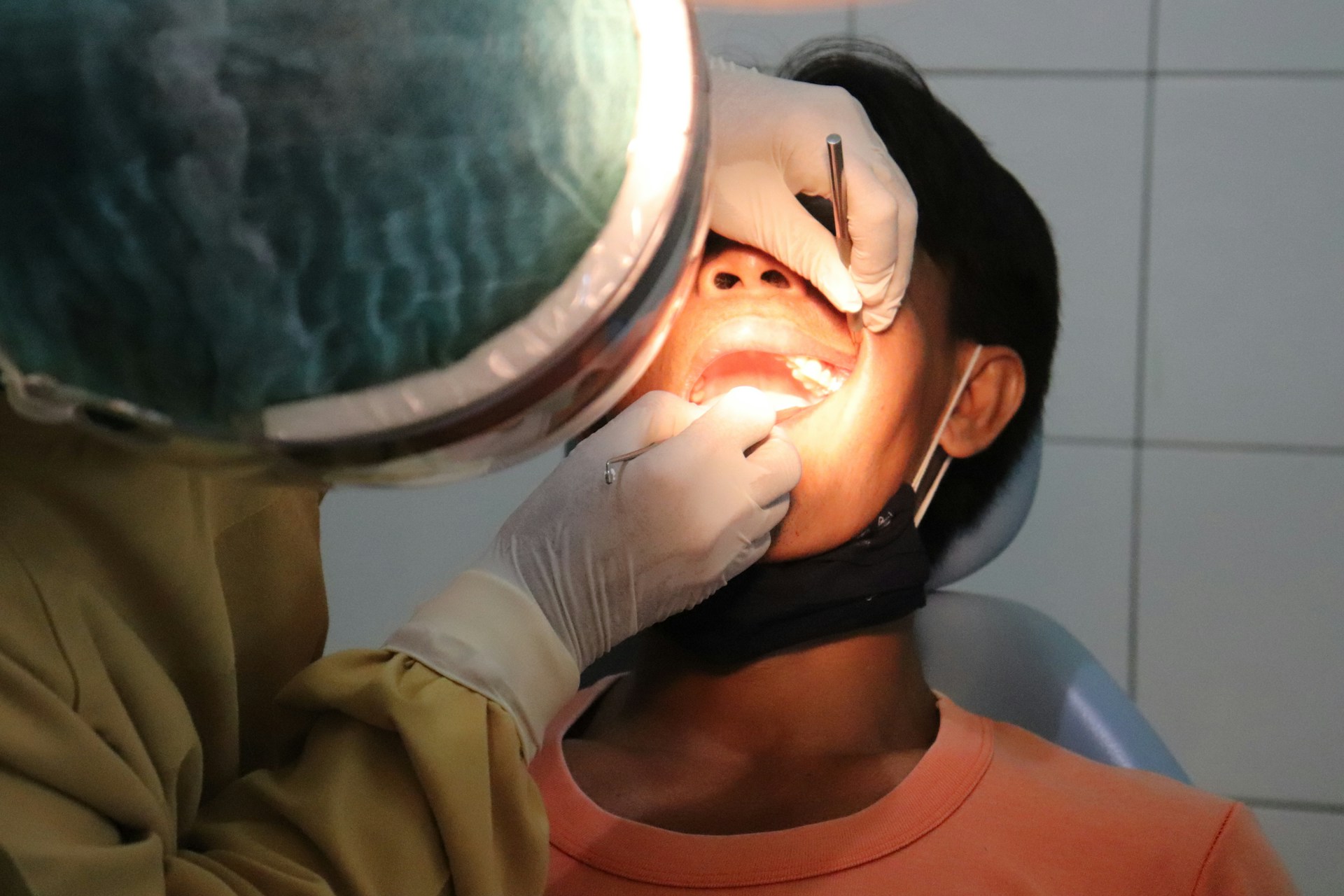
Pros and Cons of Each Career Path
We can better understand dentist vs dental hygienist, similarities and differences, by doing a brief comparison of their pros & cons.
| Aspect | Dentist | Dental Hygienist |
| Advantages |
|
|
| Challenges |
|
|
| Career Growth & Advancement Opportunities | The shortage of dentists has made this profession badly sought-after; it also offers respect in society and societal prestige | Expected to grow steadily in the next few years as a way easier method to become a dental health professional |
Table 0: Pros & Cons of Dental Hygienist vs Dentist

Two Dental Career Paths: Choosing the Right Field
We’ve gone over dental hygienist vs dentist salary and other differences between these two dental health professions. Now, it’s time to see how to choose the right path for you. Here are three tips to help you become a dental care professional in Canada:
-
Assessing Your Interests and Goals
First, you must determine your career goals and personal interests/ambitions.
- Identify what excites you about dental health
- Consider your objectives and aspirations
- Think about your preferred work environment
Keep in mind that hygienists have more predictable hours than dentists. Dentists can have very bizarre schedules, which can cause them to get overworked or burnt out.
-
Evaluating Educational Commitments
Next, you should look into your educational commitments and financial resources.
- Do you prefer an 18-month education (for hygienists) or an 8-year one (for dentists)?
- Are you prepared to bear the heavy burden of dentistry (it increases by 7% annually)?
- Are you willing to accept a lower salary as a dental hygienist?
If you’re still unsure, check out social platforms like Reddit or Quora to see how folks are talking about these two professions; it’ll give you a better idea.
-
Matching Skills & Qualities to Career Roles
Lastly, you should match your qualities and capabilities with your chosen career role.
- Hygienists require more interpersonal skills, while problem-solving and manual dexterity find their place in a dentist’s arsenal
- Patience and empathy are two critical soft skills required in both job roles
If you enjoy direct patient interaction with a focus on preventive care, dental hygiene may be more suitable; if you prefer diagnosing and treating complex issues, consider dentistry.

Pursuing Your Chosen Career as a Dental Care Professional
We’ve just done a dentist vs dental hygienist to help you choose the right career path. In short, a dentist is an oral health specialist who cleans, scales, polishes and strengthens your teeth. On the other hand, a dentist goes beyond dental hygienist duties and treats/restores your gums & teeth. A dentist’s duties are broad-ranging, while the other specializes in dental hygiene.
Talk to TempFind experts if you are confused about choosing the right profession.

